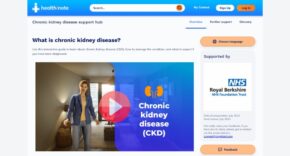
The National Health Service (NHS) is facing several challenges. Funding cuts over the past decade have put a lot of services at risk and under strain. These have been intensified by the cost-of-living crisis and the growing demand for social care.
So as a sector, the NHS needs to look for new solutions to ensure it can still deliver quality care to its patients. And that’s where considered use of Generative artificial intelligence (AI) could come in.
Chris Bush, Head of Design at Nexer Digital, discusses how this might hold the key
to revolutionising some admin and productivity challenges in the NHS but explains why it needs to be integrated ethically and responsibly.
Understanding Generative AI: A catalyst for transformative change
While the concept of AI is not new, its evolution into generative AI represents a seismic shift in its technological capabilities. Going back to the 1950s, with research such as Alan Turing’s pioneering work, machine learning and AI have undergone significant advancements, particularly with the arrival of deep learning in 2012.
One of the most striking breakthroughs in AI over recent years is the development of Large Language Models (LLMs). LLMs, built by organisations like OpenAI, have shown the world how platforms can take raw data from a wide variety of sources such as websites, documents, images and videos and use that information to create new artefacts that resemble the source material but are not identical.
As these models have developed so has the need for pre-trained datasets that are focused on achieving a particular task or outcome. Pre-trained datasets can be used to drive automation, reduce the risk of error or AI hallucinations (AI responses that contain false or misleading information that are presented as fact), and reduce the need of human intervention.
This provides some unique opportunities in how we can approach various aspects of healthcare service delivery. For instance, using trusted and credible datasets to aid the creation of content, images, and code from natural language prompts to streamline tasks and deliver high-quality information to people when they need it, in a format that best meets their needs.
How the NHS can benefit from generative AI
Generative AI has a lot of potential for the NHS and holds the key to redefining service delivery, as it can generate insights and solutions that surpass human capabilities.
The main benefits of generative AI are its ability to enhance efficiency, productivity, accessibility and decision-making processes within the NHS. This means healthcare professionals can do and accomplish more in less time, even with limited resources.
By automating tedious and repetitive tasks and streamlining workflows, AI frees up valuable time and resources so healthcare professionals can allocate their time more effectively, focusing on delivering high-quality care to patients.
But this technology isn’t just about automation; it’s about enhancing human decision-making processes and knowledge by providing insights and recommendations derived from large datasets. The NHS have countless datasets so AI can help to find what is needed in the smartest way. This enables healthcare professionals to make more informed choices and allocate resources efficiently, thereby improving patient outcomes.
As well as helping the NHS to become more productive, it can also significantly help the patients and end users. This powerful technology will help NHS professionals get to know their patients better and personalise their services as a result. By understanding the needs and unique situation of a particular patient, AI can hyper-personalise a response to that, fostering inclusivity within the healthcare system. Although experiments should be treated with caution, we are seeing powerful examples of where manual, paper-based offline processes could be transformed for practical digital application and improved data flow.
It can also help the NHS be more innovative and creative. The tech can help to create more engaging comms and content for patients and craft messages that land better by using data to tailor them to each audience.
There are already some examples of AI being used in healthcare. For instance, Kingston Council utilises a tool called “Magic Notes,” which uses speech-to-text technology to transcribe and summarise social care case worker sessions. By automating the note-taking task, it saves them time and empowers caseworkers to focus on meaningful interactions with patients, ultimately improving the quality of care.
Be My Eyes is another service being used to support people with visual impairments. Users can use the app to take a photo of something and then the app will provide feedback on it. The amount of detail, quality and nuance the app picks up on the photos is great, helping to remove barriers and empower the individual.
As discussed, the applications of AI in healthcare are vast and far-reaching. However, with great power comes great responsibility. As we embrace AI-driven innovation, it’s crucial to do so ethically and responsibly.
Creating an inclusive NHS
One major opportunity with AI is making healthcare more inclusive and accessible. By leveraging generative AI, the NHS can develop services and solutions that are fundamentally accessible to all, regardless of a person’s background or ability.
There are approximately 16 million people in the UK with some sort of disability, representing 24% of the population, and many of these using healthcare services will need extra support.
AI can help make things easier for them. For example, by converting text to speech for the visually impaired or simplifying complex information for neurodiverse individuals who may experience cognitive overload, AI has the power to lower and remove barriers, as well as empower these users.
So, when considering AI applications, it’s important to embed inclusive design principles into every aspect, ensuring that no one is left behind in the pursuit of progress.
You need to think about how you can support different types of interaction preferences, ensuring that any service you develop allows people to access the information in a way that meets their needs. So, if your tool or service is accessible by keyboard and mouse, does it also work by touch? And with the arrival of voice and conversational AI, can people access it in a voice platform as well?
If you ask some generative AI models to make their outputs accessible, they can do so. But the best way to test services is to put them in front of real users, ask them whether it’s meeting their needs and get feedback to make sure what you’re delivering is accessible to everyone.
Overcoming potential challenges and creating opportunities
There is no doubt that AI is going to transform the public sector and how it operates. Yet, it also presents challenges that must be addressed to ensure it’s used responsibly and ethically.
It’s going to require investment, training and most importantly some serious ethical considerations when we think about how to use this technology. Upholding ethical standards will be key to building trust and safeguarding patient privacy. This includes data governance, transparency, and accountability. For example, being careful with data and making sure everyone’s information is safe.
Implementing generative AI solutions may also require significant investment in infrastructure, training, and staff development. NHS professionals will need to be equipped with the necessary skills to use AI properly so they can get the most out of it. This will be key for uptake and in fostering a culture of innovation.
The UK National AI Strategy provides a framework for integrating AI into the public sector effectively. By leveraging national initiatives and resources like this, the NHS can navigate the complexities of AI adoption and drive innovation in healthcare delivery.
The future of the NHS
While AI isn’t going to fix everything, it’s a big step forward. It offers numerous opportunities for the NHS to enhance efficiency, improve patient care, and foster inclusivity – It’s a chance for the NHS to do more with less and to make healthcare better for everyone.
But with all new technology, it’s important to be mindful and ensure it is implemented responsibly with patient’s needs at the fore.












